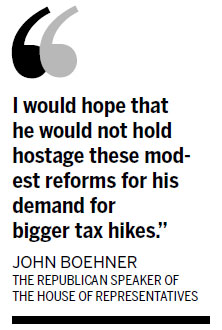Obama presents $3.77 trillion budget

US President Barack Obama proposed a $3.77 trillion budget on Wednesday that combines controversial cuts to social safety net programs with tax increases on the wealthy in a package the White House hopes will jump-start deficit-reduction talks.
The proposal, an annual attempt to identify and fund the president's policy desires, is unlikely to become law.
Its deficit-cutting measures mirror an outline Obama put forward last year that was rejected by John Boehner, the Republican speaker of the House of Representatives. There were no major departures from that plan, which the White House has stressed for weeks is still an offer.
Obama's budget included cuts in Social Security, the pension program for retirees; and in Medicare, the health insurance program for seniors. While Obama has made these proposals before, their prominence in Wednesday's budget was designed to demonstrate his seriousness about negotiating with Republicans on ways to reduce the federal deficit.
"I don't believe that all these ideas are optimal, but I'm willing to accept them as part of a compromise," Obama said during brief remarks in the White House Rose Garden.
"When it comes to deficit reduction, I've already met Republicans more than halfway. So in the coming days and weeks, I hope that Republicans will come forward and demonstrate that they're really as serious about the deficits and debt as they claim to be," he said.
The budget predicts the deficit will fall to $744 billion in 2014, or 4.4 percent of GDP, from an estimated $973 billion in 2013. Fiscal 2014 begins on Oct 1.
It aims to achieve $1.8 trillion in deficit reduction over 10 years. Added to the $2.5 trillion in deficit cuts from past efforts, the total reduction would be more than the $4 trillion both parties have said would be an acceptable goal.
The ratio of deficits to GDP would fall to 2.8 percent in 2016, below the 3 percent level that economists say is necessary to put debt on a path to shrinking as a share of the economy.
The proposal revives Obama's call that wealthier people help more with deficit reduction. It would require those making $1 million a year or more to pay at least 30 percent of their income in taxes, after gifts to charity.
Obama's budget also included proposals to cap tax breaks for wealthier taxpayers, increase the estate tax and end the tax break for "carried interest" - profits earned by fund managers like those who run private equity and other investment firms.
Republicans, who are wary of any push to raise taxes after passing a rate increase for the wealthy at the beginning of this year, largely dismissed Obama's proposal.
Boehner, Obama's main opponent in deficit talks, said the president's proposed cuts to entitlement programs such as Social Security were praiseworthy but not sufficient.
"I would hope that he would not hold hostage these modest reforms for his demand for bigger tax hikes," Boehner said.
"The president got his tax hikes in January. We don't need to be raising taxes on the American people. So I'm hopeful in the coming weeks we'll have an opportunity, through the budget process, to come to some agreement," he said.
Seeking a deal
Obama's hope is to build a coalition of lawmakers willing to move toward his position, although most observers see that as unlikely.
In the latest round of an ongoing "schmooze" offensive, Obama had 11 Republican senators to the White House for a steak dinner on Wednesday. The White House said they had a "constructive, wide-ranging discussion" that included how to reduce the deficit and efforts to overhaul immigration laws and tighten gun regulations.
Republican Senator Johnny Isakson of Georgia, who organized the dinner for his Senate colleagues, called the session productive.
"Sitting down to talk about how to get our arms around our debt is a good first step to what I hope will be an ongoing discussion and a path forward to solving our nation's problems," he said.
Both sides were unable to prevent some $85 billion in across-the-board "sequestration" spending cuts from going into effect on March 1.
Obama's budget proposal would replace those cuts with his original deficit-reduction proposal from December. That offer included $930 billion in spending reductions and about $580 billion in tax revenues.
Controversially, it proposes using a less-generous measure of inflation to calculate cost-of-living benefit increases for the beneficiaries of some federal programs. This change would have the effect of shrinking payments to some who receive Social Security benefits.
Although Obama has pledged to shield the most vulnerable beneficiaries, the proposal has drawn strong opposition from fellow Democrats and groups representing labor.
Representative Paul Ryan, the Republican vice-presidential nominee last year and a potential 2016 presidential candidate, said Obama's budget was "worse than status quo" because of its tax and spending hikes, but he said there were some small areas of common ground for further discussion on entitlement programs.
Reuters
(China Daily 04/12/2013 page11)














